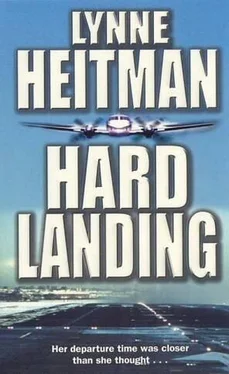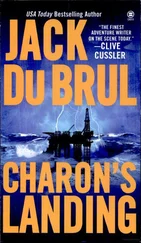"I'm not from headquarters. I've spent eighteen months there out of fourteen years. I've got as much field experience as you do."
"Whatever."
"Is that what's going on here? Do you resent me because you think you should have gotten this job?"
"I wouldn't take the job if they begged me."
"Is it because I came from staff?" That was my last guess. I wasn't going to play twenty questions trying to figure out what his problem was.
"All I know is you're on the fast track," he said, "and I'm going to be in Boston forever. So it doesn't matter to me. You understand?"
"No."
"You can take all the credit when things go well, you can blame me when they go wrong. I don't care about my career. I don't care about getting promoted. What I do care about is being left alone to do my job the way I need to. Just because I'm not out where people can see me all the time doesn't mean I'm not doing my job. And the next time you want to know something about me, ask me and not my employees."
Dan's name boomed from the loudspeakers. Before they could even finish paging him, he was on his feet gathering up all the dead sugar packets and heading for the trash.
"Dan, if you walk away from me like you did yesterday, it's going to make me angry, which might not make any difference to you, but it will ruin my entire day because I'm going to have to spend it trying to figure out how to deal with you." He stood with the trash in one hand, his cup in the other, staring down the concourse toward the gates. "I don't want to deal with you." I said, backing off a little, "I want to work with you."
He tapped his chair a few times with his free hand. He didn't sit down, but neither did he walk away.
"Losing a friend in the way that you did has got to be tough. If there is anything I can do to make it easier for you, I will do it."
"I'll deal with it."
"Fine. While you're dealing with it, think about this. Do you want to work with me? If you don't, we'll discuss alternatives."
His hand grew still on the back of the chair. "I'm not leaving here."
"That's not what I asked you to think about. Do you want to work next to me? That's the question and I want a definitive answer."
"I'm not leaving Boston," he said flatly, then stalked over to toss his garbage. He came back and said it again, just in case it wasn't clear. "There's no way I'm leaving Boston. And if you and this fucking company try to get rid of me the way you did Ellen, I'm going to blow the whistle on what's going on around here, so help me God."
He turned quickly and he was gone. He must have spotted the confused elderly woman as we were talking because he went straight for her. He read her boarding pass, offered his arm, and helped her to her gate. Then without looking back, he melted into the river of passengers, gliding smoothly through the crowd, weaving in and out until I couldn't see him anymore.
He'd disappeared on me again, leaving me to sort through a whole bunch of responses I never had a chance to give, and one big question. What exactly was going on around here?
Molly was long gone by the time I made it back to my office, and Dan had been cagey enough to get through the rest of the day yesterday and all day today without bumping into me once. There had been Dan-sightings all over the airport, but I never managed to catch up with him. I sat down at my desk to try to find the bottom of my in-box.
I dispensed with the mail from headquarters-the usual warnings, threats, and recriminations disguised as reports, memos, and statistics-putting it aside to ignore later. I reviewed the station performance report from Dan, which said we were over budget and under-performing. No kidding. And I drafted a perfunctory response to a perfunctory question from Lenny asking why that was. Most of what was left was from the suspense file, things that Ellen Shepard had reviewed and filed for later handling. Many of the documents had her handwritten notes in the margins. Her handwriting was careful, neat, and very controlled. You could have used it to teach cursive writing to schoolchildren. Halfway through the stack, I began to get a sense of her, to hear her voice. She spoke a language we shared, the language of work.
You could tell by her questions that she was new to an operation. She had lots of them-questions about the equipment, manning, about why we do things the way we do, about people who worked for her and how much things cost and why. Her inexperience showed, but so did her doggedness. When she hadn't gotten a thorough answer, she'd simply asked again. And judging from her correspondence with the union, she didn't back down. She may have been a staff person and she may have taken a good field assignment away from someone more qualified-say, for instance, me. But I had to admit that she had worked hard. She had tried.
When I finally hit the bottom of the stack, I had one item left that I didn't know what to do with. It was an invoice from a company called Crescent Security. It had no notes, no questions, nothing to indicate why it was there and what I should do with it. So I did what I usually did in those situations-suspense it for a few days and deal with it later. With that taken care of, I sat back in my chair and stared straight ahead. It had already been dark for several hours, and the windows had turned into imperfect mirrors, reflecting back to me a picture of institutional emptiness-and there I was in the middle of it. As I sat and stared at my reflection, which was particularly chalky in the hard-edged, artificial glare of the fluorescent lights, I wondered, vaguely, what other people like me were doing tonight. I wondered if Ellen had ever looked at herself like this and wondered the same thing.
It occurred to me that if I couldn't see out because of the light, then anyone on the ramp could look up and see in. From down there my office must have looked like a display case in the Museum of Natural History. I went over to close the blinds and took a quick peek outside. I was relieved to see the operation humming along. Tugs were rumbling back and forth, tractors were pushing airplanes off the gates, and crews were loading boxes and bags and trays of mail into the bellies of large aircraft. A line of snow showers had passed us by to the south, bringing in its wake slightly warmer air that hung in a dense, wet fog that diffused the light on the ground and softened the scene. If Monet had painted our ramp, it would have looked like this.
It was time to go home-or at least back to my hotel. I did a quick search of the desk, thinking maybe I would find the file on Angelo DiBiasi so I could keep my promise to Lenny. I hadn't had a chance to ask Disappearing Dan about the case, and at the rate I was going, it would be another week before I was ready to make a decision. I found a drawer filled with hanging files, each with a color-coded tab labeled in Ellen's handwriting. I riffled through the neat rows and found nothing on Angelo. I tried the middle drawer. Nothing there except company phone books, a bound copy of the union contract, a few office supplies, and a pocket version of the OAG. The Official Airline Guide was a typical airline employee accouterment, a schedule for all airlines to all cities. Ellen's was more current than mine, so I threw mine out and tossed hers into my briefcase. When I did, something slipped out from between the pulpy pages. It was a United Airlines frequent flier card-and it was issued in Ellen's name.
What was she doing with this? Only real passengers had these. The only point in having one was to earn free air travel, and we already had that. And to earn miles you had to, God forbid, pay for your ticket. Airline employees would do almost anything before they did that. I thumbed through the guide to see if Ellen had been gracious enough to highlight a destination or turn any corners down. I should have known better. I was willing to bet that Ellen had been a bookmark kind of a girl-no turned-down pages allowed. The guide had neither, but on the back of the card was the phone number for customer services. If United was like our airline, I could call their electronic system and get the last five segments she'd flown, a very helpful feature if you've forgotten where you've been.
Читать дальше












